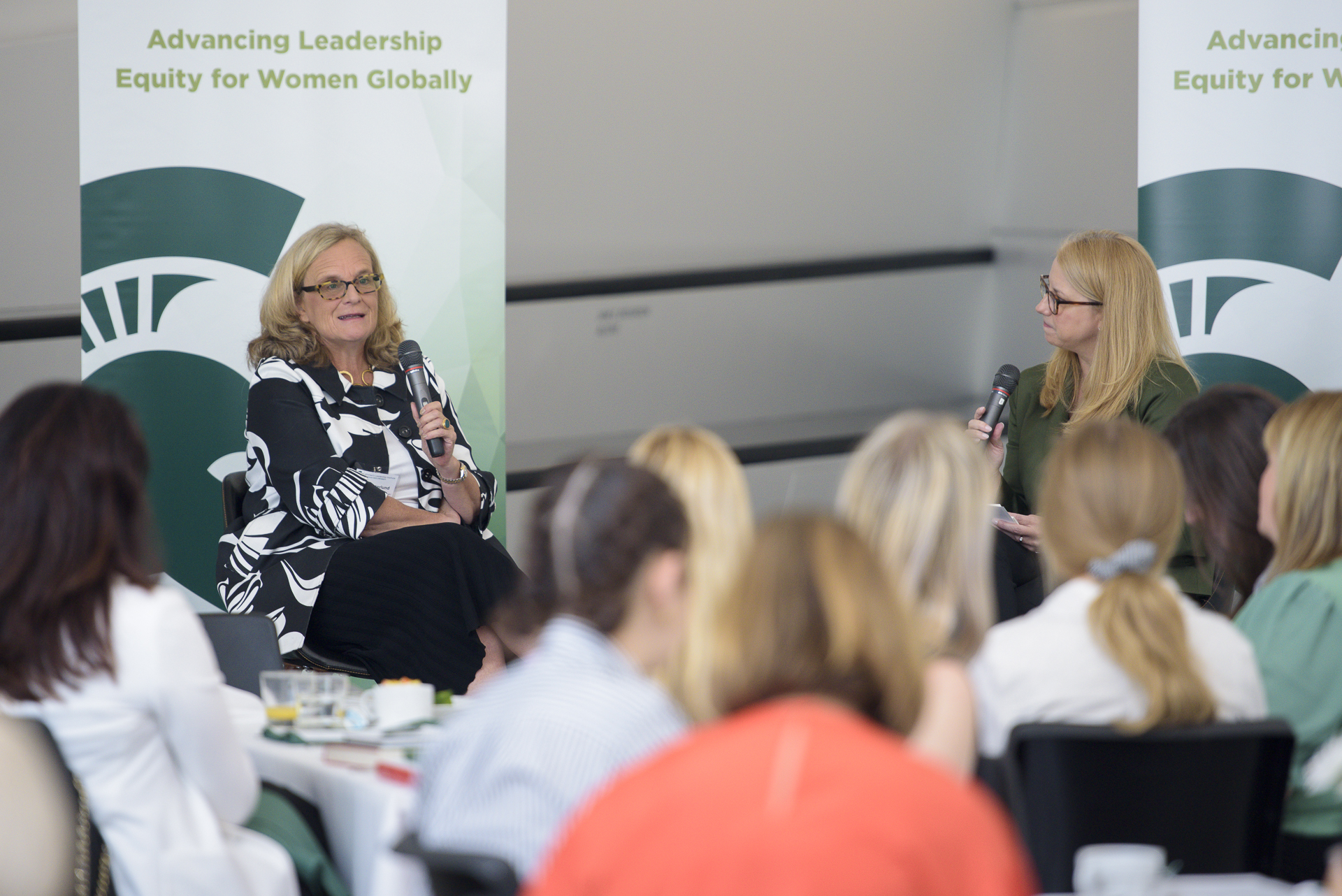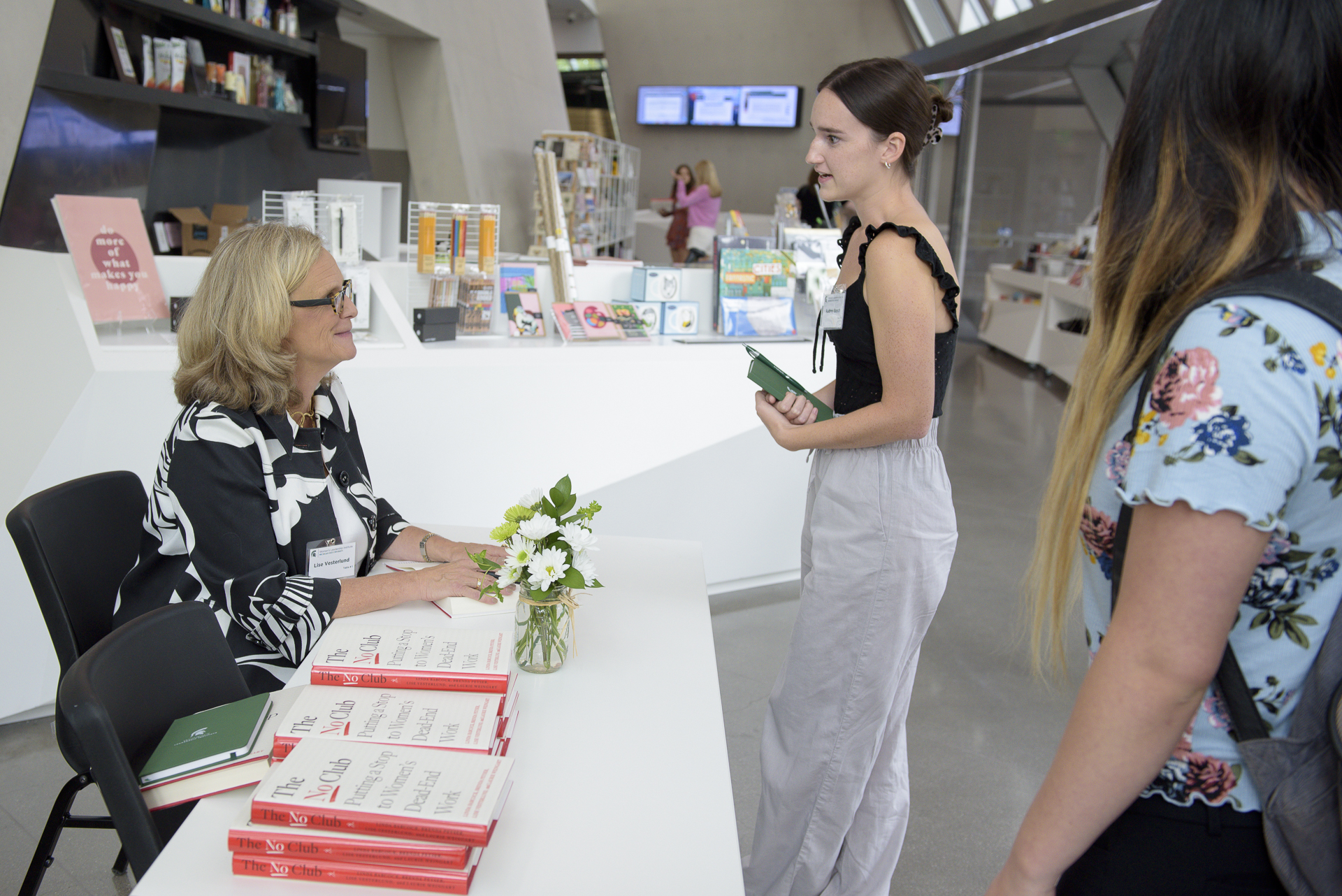Women’s Leadership Institute Hosts “No Club” Book Club with Lise Vesterlund
September 28, 2022 - Emily Jodway

Vesterlund, the Andrew W. Mellon Professor of Economics at the University of Pittsburgh and the Director of the Pittsburgh Experimental Economics Lab (PEEL), has spent much of her career researching gender differences and advancement in the workplace. Vesterlund and three colleagues initially began meeting to air their frustrations on what they saw as an abundance of “Non-Promotable Tasks (NPTs)” in their lives, those work assignments that typically go unrewarded. Many of these duties outside the job description fall on the backs of women, who are disproportionately expected to handle tasks like planning office parties, volunteering for various committees, or taking notes at meetings.
The group then took their thoughts to PEEL to conduct real-life research on why women, in particular, were doing the bulk of this work. Vesterlund and her colleagues found several instances of this phenomenon, including one organization where women spent more than 200 hours on non-promotable work compared to their male colleagues.
“It’s the type of work that keeps the wheels going at the workplace, but not work that’s being put towards our careers,” Vesterlund explained. “There’s a collective expectation in organizations that women are going to step up and volunteer to do this work.”
The group has since published The No Club: Putting a Stop to Women’s Dead-End Work, outlining the findings of their research and the changes that organizations can make to offload some of the burden of NPTs on women, so that they can shift their focus to more Promotable Tasks (PTs) that are beneficial to progression along their career paths. The hope is that these women will be seen for the true value and contributions they bring to a company when they are able to participate in more work that directly benefits the goals of the organization.
Following an introduction by Dr. Amanda Guinot Talbot, Director of the Women’s Leadership Institute, and moderated Q&A with Susi Elkins, the Chief Community Development Officer at Michigan State University Federal Credit Union, Vesterlund opened up the floor to the Student Cohort and other members of the WLI for further discussion. Vesterlund had plenty of advice for young professionals to assert themselves early in the workplace and have positive conversations on NPTs with their superiors.
The conversation felt particularly meaningful given the newly-emerging idea of ‘quiet quitting,’ a form of silent resistance in the workplace in which employees keep their job duties in line with just what they are paid to be doing, without taking on any extra duties or volunteering for tasks that veer off the tracks of their main workload. Young people are one such group that is being affected by this, with younger, newer employees often being expected to take on the brunt of these extra tasks.
“Young professionals get handed a lot of NPTs early on,” Vesterlund said. “And it’s very challenging for women to say no, because they are working in a much tighter culture where we have very strict rules for what they can say without getting negative backlash.”
Vesterlund was able to give plenty of relevant advice during the discussion, as many of the findings presented in her new book aligned closely with the concepts behind this phenomenon of ‘quiet quitting’ and who should take on extra assignments in the workplace.
Vesterlund encouraged young leaders to build confidence early on and have conversations about new tasks with managers that involve phrases like “I think my contribution could be even bigger in this area,” or “I know what matters most to the organization and I want to assist in reaching these goals.” She emphasized the benefits of identifying how best to use your time each day, what tasks are most important to you, and which tasks you find the most value in.
She also suggests “Saying ‘no’ by saying ‘yes’ to an even larger task,” by showing enthusiasm toward the given task but also having a conversation about the many other ways your skill set would be valuable. “You want to be seen as a team member, somebody who is really out there to help improve the organization. So when you get asked to do something that clearly is an uncomfortable task, and you may not yet feel empowered to say ‘no,’ you can try to negotiate it in a way so that it becomes more of an [important] task.”
 The WLI Student Cohort had nothing but positive things to say about Vesterlund’s discussion and their takeaways on the day. “I felt very empowered and inspired by her message,” Cohort member Danielle Atangana commented. “I feel hopeful for the future and knowing that I don’t always have to say yes to everything that is presented to me. That it’s okay to say no. We have to be strategic about the way that tasks are presented to us in order to be successful in this male-dominated atmosphere.”
The WLI Student Cohort had nothing but positive things to say about Vesterlund’s discussion and their takeaways on the day. “I felt very empowered and inspired by her message,” Cohort member Danielle Atangana commented. “I feel hopeful for the future and knowing that I don’t always have to say yes to everything that is presented to me. That it’s okay to say no. We have to be strategic about the way that tasks are presented to us in order to be successful in this male-dominated atmosphere.”
Fellow student Katie Heeder said, “Today has given me lots of food for thought on how I can realistically apply these principles to my life, especially as a college student and in my roles here. I want to be more assertive about making sure other people are taking on some of that non-promotable work.”
Gabby Wahla, another Student Cohort attendee, added: “We were super excited to have [Vesterlund] come here, and that students got to hear from her and learn and ask questions of their own. It was definitely empowering.”
Vesterlund added that having the opportunity to speak with young people also holds particular weight. “The students that we bring in are probably the group that I value the most,” she said. “Getting young women to think strategically about their career is really rewarding, and the impact is huge. It can also be a challenge, because you know that when they join the workforce, they’re going to be faced with very strong expectations of saying ‘yes’ to work. You need to help them get their foot in the door and play along until they can truly exercise their right to decline some of that work.”
More information on Vesterlund and the No Club can be found here.
Here are what some other members of the WLI Student Cohort who attended had to say about the event:
- “I thought that it was a very impactful conversation. I’m only a freshman, but as someone who is going into the workplace after undergrad, it was really good to listen to.”
- “My biggest takeaway was that it's really important for women to distinguish what's promotable and non-promotable work early on in your career. It's important for you to grow and use these NPTs to help the organization, but then there's a point where you have to draw the line in order to succeed and move up.”
- “I liked the emphasis on making sure that you are doing promotable work to benefit yourself, but are still doing some non-promotable work that helps everyone out.”
- (WLI Executive Board Member Cherie Talbert): “It was a really thoughtful application to something that is prevalent across all industries. It’s wonderful that we’re talking about this at all stages of women’s professional development.”

